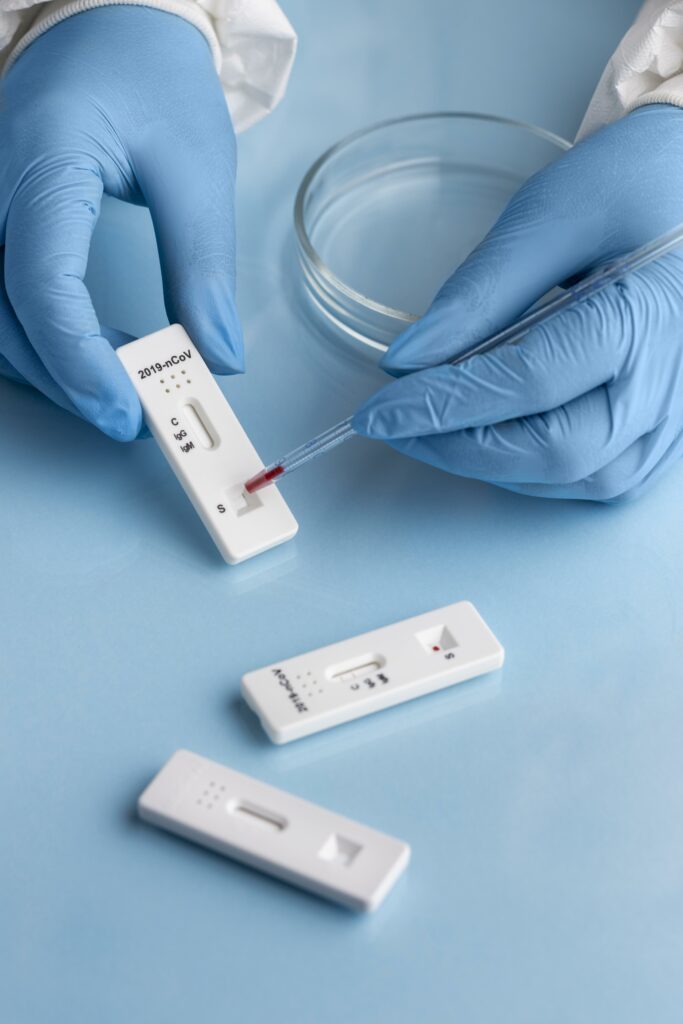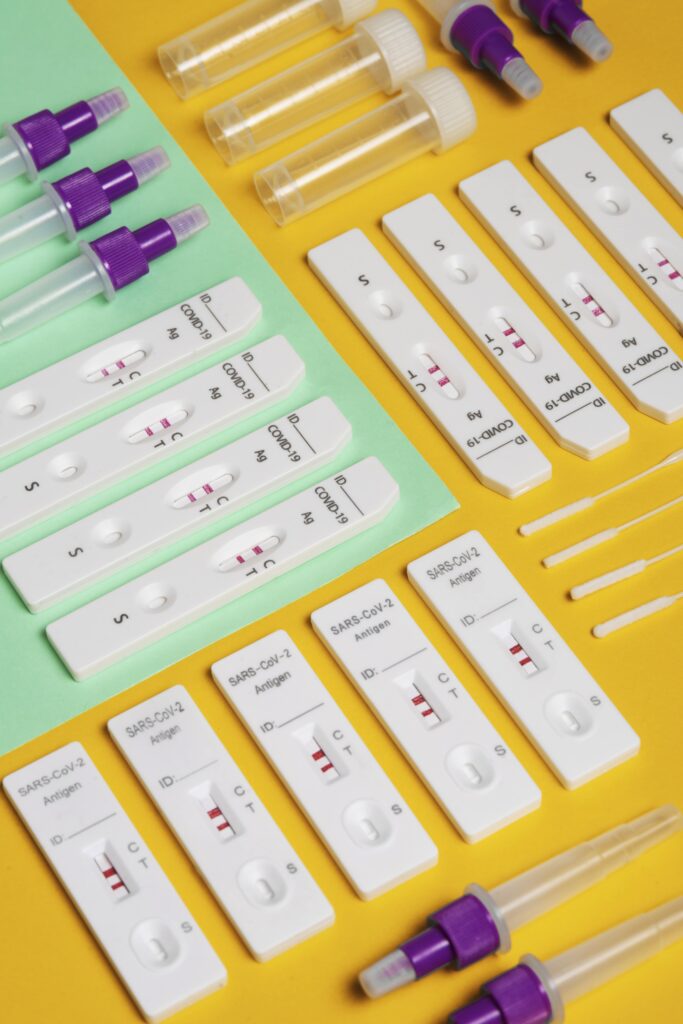New Waves on the Way: Discover the Professional Rapid Tests That Detect New COVID-19 Variants
Odemshop
AuthorEurope, a continent that has faced multiple waves of the COVID-19 pandemic, is now grappling with the emergence of two new variants: Eris and Pirola. These variants, believed to have originated from different parts of the world, have found their way into the heart of Europe, causing significant concern among health experts and the general […]

Europe, a continent that has faced multiple waves of the COVID-19 pandemic, is now grappling with the emergence of two new variants: Eris and Pirola. These variants, believed to have originated from different parts of the world, have found their way into the heart of Europe, causing significant concern among health experts and the general public. The rapid spread, combined with the potential resistance to current vaccines, poses a fresh set of challenges for European nations and opens the question, as well, if the current professional rapid tests can detect these COVID-19 variants.
A Closer Look at the Numbers
The recent data reveals a concerning uptick in the number of cases attributed to the Eris and Pirola variants in several European countries. Let’s delve into the statistics:
- Germany: With a total of 38,428,685 cases, Germany remains one of the hardest-hit countries in Europe. The exact number of Eris and Pirola variant cases is still under investigation, but early indications suggest a significant percentage, as 182 patients with COVID-19 are in intensive care in Germany and 46,489 new cases in the past week.
- France: France reports a total of 40,138,560 cases. The health ministry has raised alarms over the rapid spread of the new variants in several regions, since September 4-10 shows there were 54,699 new cases reported.
- Ireland: The Emerald Isle has recorded a total of 1,719,064 cases. The health department is closely monitoring the spread of Eris and Pirola, with new containment measures in place as the numbers were at 652 new cases in the past week.
- Croatia: With 1,274,834 total cases, Croatia’s health system was under strain. In the last 7 days, 237 new cases of infection with the SARS-CoV-2 virus were recorded.
While these numbers are alarming, it’s crucial to note that research is ongoing, and the exact impact of these variants remains to be seen.
Vaccine Efficacy
One of the primary concerns with the emergence of new variants is the efficacy of existing vaccines. Preliminary studies suggest that current vaccines might offer reduced protection against Eris and Pirola, necessitating booster shots or even new vaccine formulations.
Economic Impact
The resurgence of cases, driven by these new variants, threatens to derail the fragile economic recovery in many European countries. Travel restrictions, lockdowns, and reduced consumer confidence could lead to another downturn.
Mental Health Concerns
The prolonged nature of the pandemic, combined with the emergence of new threats, has taken a toll on the mental well-being of many. It’s essential to address this often-overlooked aspect of the crisis.
The battle against COVID-19 is far from over. The emergence of Eris and Pirola underscores the need for vigilance, adaptability, and global cooperation. While the situation is concerning, it’s also a reminder of the importance of science, research, and community solidarity in overcoming challenges.
In light of these developments, we further explore the landscape of testing. Below, we present insights on various tests, their mechanisms, key features, and specifically, their capability to detect the new variants, as confirmed by the manufacturers themselves.

Why Different Tests Yield Different Results
The world of COVID-19 testing is vast and varied. With the emergence of new variants, the accuracy and reliability of tests have become paramount. But why do some tests detect a variant while others don’t? The answer lies in the technology and methodology used. Some tests are designed to detect specific proteins or genetic sequences of the virus. If a variant has a slight change in these sequences, a test might not pick it up.
The COVID-19 pandemic has brought with it a myriad of challenges, and one of the most pressing has been the accurate detection of the virus. With the emergence of new variants, the efficacy of tests has been put under the microscope. But why do some tests detect certain variants while others don’t?
The answer lies in the science behind the tests. Different tests target different parts of the virus. For instance, while some tests might target the spike protein of the virus, others might focus on its nucleocapsid protein. Variants often carry mutations in these targeted regions, which can affect the test’s ability to detect the virus. Moreover, the sensitivity and specificity of tests can vary. Sensitivity refers to a test’s ability to correctly identify those with the virus, while specificity refers to its ability to correctly identify those without it. A test with high sensitivity but low specificity might produce more false positives, while the opposite might result in more false negatives.
This is why it’s crucial to choose a test that’s updated and validated against the latest strains.
Choosing the Right Professional COVID-19 Test
- Validation Against Variants: Ensure the test has been validated against the latest variants of concern.
- Sensitivity & Specificity: A test with high sensitivity will detect most people with the disease, while high specificity ensures that those without the disease are not falsely identified.
- Turnaround Time: In many settings, getting results quickly is crucial. Opt for tests that provide rapid results without compromising accuracy.
- Ease of Use: For high-throughput settings, a test that’s easy to administer can save time and reduce errors.
Manufacturers That Detect the New Variants
Several manufacturers have stepped up to the challenge, ensuring their tests are up-to-date with the latest variants:
Testsealabs – Hangzhou Testsea Biotechnology Co., Ltd.: A renowned name in the diagnostic industry, Testsealabs has consistently updated its tests to detect the latest strains. (download link)
Green Spring – Shenzhen Lvshiyuan Biotechnology Co., Ltd.: With a commitment to accuracy, Green Spring ensures its tests are both sensitive and specific.
Longsee – Guandong Longsee Biomedical Co., Ltd.: Longsee’s tests are known for their rapid results and high reliability.
Bioteke – Bioteke Corporation (wuxi) Co., Ltd.: A leader in the biotech industry, Bioteke’s tests are trusted by professionals worldwide.
Sejoy – Hangzhou Sejoy Electronics & Instruments Co., Ltd.: Sejoy’s SARS-CoV-2 Antigen Rapid Test is designed to detect the presence of proteins specific for the SARS-CoV-2 virus, ensuring timely and accurate results.
Navigating the Future: The Importance of Informed Choices in COVID-19 Detection
In conclusion, as the COVID-19 landscape evolves, so must our approach to testing. By choosing the right test and staying informed about the latest developments, we can ensure accurate results and stay one step ahead of the virus.
At Odemshop, we’re here to assist you in making informed decisions. Not only can we provide detailed information regarding the tests, but we can also guide you in selecting the most suitable ones for your needs. All you need to do is contact us through our contact form, and we’ll be more than happy to help.


